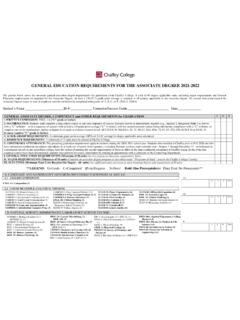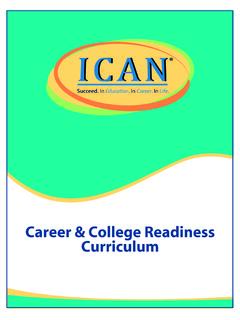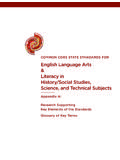Transcription of PROMOTING SELF-ADVOCACY SKILLS FOR STUDENTS …
1 PROMOTING SELF-ADVOCACY SKILLS FOR STUDENTS WITH DISABILITIES Nebraska Department of Education Office of Special Education March 2010 !"#$#%&'()*+, #2/23)*4&,,*)-#")*%50+'%*)6&%7)0&*/8&,&% &+*)) SELF-ADVOCACY refers to the ability of a person to understand and explain his or her disability, strengths, and challenges. It is the ability to ask for help when it is needed. The SELF-ADVOCACY movement was started by and for people with disabilities because they wanted to speak for themselves rather than having others speak for them. Strong SELF-ADVOCACY SKILLS are important for all, and particularly for those individuals with disabilities, in order to be successful in school and in the adult world.
2 What is the purpose of this folder? The SELF-ADVOCACY Committee, a sub-group of the Nebraska Transition Practitioners Committee, was formed to identify ways to assist teachers as they work with transition-age STUDENTS in acquiring SELF-ADVOCACY SKILLS . The teaching of SELF-ADVOCACY SKILLS is not intended to be a separate class or curriculum, but rather is most effective when incorporated into everyday activities and practices. This folder highlights information identified by the SELF-ADVOCACY Committee as helpful for teachers on this important topic. Additional materials and links to resources are posted on the Nebraska Department of Education Transition website at: :8080/NDEtransition/.
3 What information is provided? Information in this folder is organized around the transition components of the IEP, as defined in the Individuals with Disabilities Education Act (IDEA) and Nebraska Rule 51. Transition planning involves the development of a coordinated set of activities to be provided in the areas of: course of study; instruction; related services; community experiences; employment/post-school adult living; daily living SKILLS ; functional vocational evaluation; and interagency linkages. A checklist was developed by the SELF-ADVOCACY Committee to assist in identifying areas to be addressed for individual STUDENTS . The committee then identified activities and strategies to assist teachers as they begin incorporating SELF-ADVOCACY concepts into the curriculum and everyday activities.
4 It should be noted that these activities and strategies must be individualized for each student based upon their needs, preferences and desired post-school goals. The examples will not apply to every student, will not necessarily be completed in the course of one school year, or only be addressed in the classroom. And, last but not least, a resource listing has been compiled to provide further information on this topic. Resources include websites, print materials, and sample forms that may be useful as teachers, STUDENTS , and families work together to develop ever important SELF-ADVOCACY SKILLS . *+, #2/23)27+24,&*%) Instructions: The following checklist has been developed to assist in identifying a student s SELF-ADVOCACY SKILLS .
5 Check the box for each item to which the student can reply yes . Since the checklist is organized around the transition components of the IEP, it can easily be used to identify areas that need to be addressed. COURSE OF STUDY ! 1. I have a projected graduation date. ! 2. I helped plan my schedule for this year. ! 3. I know what job I want to do in the future. ! 4. I know which classes will prepare me for my future job. ! 5. I have a career plan that I have shared with my teacher, counselor, and/or family. INSTRUCTION ! 1. I can describe why I am in special education. ! 2. I know what self -disclosure means. ! 3. I understand and can explain my learning style.
6 ! 4. I can explain my strengths and challenges. ! 5. I ask teachers and others for help and accommodations, when needed. ! 6. I attend and participate in my IEP meetings. ! 7. I know the requirements and coursework necessary for entering post-secondary education. RELATED SERVICES ! 1. I have received and/or may need to receive services in the following areas: " speech /Language " Physical Therapy " Occupational Therapy " Transportation " Medical services " Orientation and mobility services " Interpreting services " Counseling " Psychological services " Job coaching ! 2. I use an assistive technology device and/or programs. ! 3. I know who can help me get the services I need after graduation .
7 COMMUNITY EXPERIENCES ! 1. I have/plan to get a driver s license or have a plan to meet my transportation needs. ! 2. I know my legal rights and how they change at ages 18, 19 and 21. ! 3. I have registered with the Selective Service (for males age 18 or over). ! 4. I am a registered voter (age 18 or over). ! 5. I have activities and things I like to do during my spare time. ! 6. I have a friend or mentor (someone who can help me). EMPLOYMENT/POST-SCHOOL ADULT LIVING ! 1. I know that I can work. ! 2. I know the job that I want. ! 3. I know the SKILLS I need to get a job. ! 4. I know the barriers to getting the job I want. ! 5. I have a plan to overcome the barriers.
8 ! 6. I have completed a job-seeking course. ! 7. I know what is required for me to enter post-secondary education. ! 8. I know what information/paperwork I need to take with me when I leave high school. ! 9. I can manage my personal care needs on the job or in a post-secondary setting. DAILY LIVING SKILLS ! 1. I have the SKILLS to live on my own. ! 2. I know how to be safe in my own home. ! 3. I can budget and manage my money. ! 4. I can manage my health care needs. ! 5. I can make positive choices related to recreation and leisure activities. ! 6. I use appropriate social SKILLS at work, school, and the community. ! 7. I can manage my personal care needs.
9 FUNCTIONAL VOCATIONAL EVALUATION ! 1. I have opportunities to explore my interests, SKILLS , and needs. ! 2. I have used my interests, SKILLS , and needs to drive my transition plan. ! 3. I have participated in the development of my post-school goals. INTERAGENCY LINKAGES ! 1. I know what services I need. ! 2. I know what agencies and services are available. ! 3. I know how and when to apply for these services. /2%&1&%&+*)/'0)*%"/%+(&+*)-#")!"#$#%&'() *+, #2/23)*4&,,*))The following pages provide suggestions for activities and strategies that may be used when PROMOTING and developing SELF-ADVOCACY SKILLS for STUDENTS with disabilities. These suggestions are intended to assist educators in incorporating SELF-ADVOCACY concepts into the curriculum and everyday activities.
10 While the activities and strategies are organized around transition components of the IEP (listed below), it is recognized that there is overlap, with many of the activities and strategies being relevant to a variety of areas. Course of Study Instruction Related Services Community Experiences Employment/Post-School Adult Living Daily Living SKILLS Functional Vocational Evaluation Interagency Linkages !"#$%&'"('%)#*+'1. I have a projected graduation date. 2. I helped plan my schedule for this year. 3. I know what job I want to do in the future. 4. I know which classes will prepare me for my future job. 5. I have a career plan that I have shared with my teacher, counselor, and/or family.




